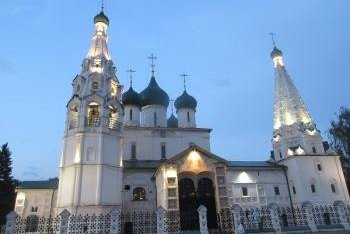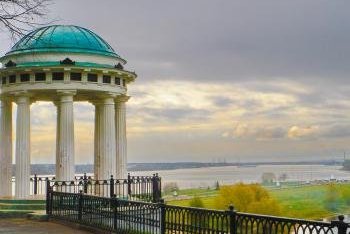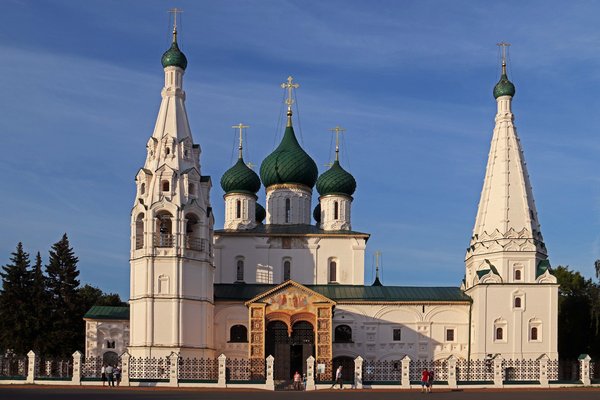Russia
Yaroslavl
The Historical Centre of the City of Yaroslavl is dotted with 17th-century churches and an example of Catherine the Great's neoclassical town planning reform.
In the 17th century, Yaroslavl was Russia's second-largest city and its main churches date back to that period. They belong to the so-called Yaroslavl type: built of red brick, with bright tiled exteriors. In the late 18th century, the cityscape was redeveloped in a harmonious and uniform Neoclassical style.
Community Perspective: Yes, another day trip from Moscow, though a long one, so you may be better off staying overnight (see Nan’s review for the advantages). The city is worth about half a day and its leafy streets are easily walkable. The views from the Volga walkway are great. Solivagant refers to the visual impact the Soviet period had on Yaroslavl.
Site Info
Official Information
- Full Name
- Historical Centre of the City of Yaroslavl (ID: 1170)
- Country
- Russia
- Status
-
Inscribed 2005
Site history
History of Yaroslavl
- 2005: Inscribed
- Inscribed
- Type
- Cultural
- Criteria
- ii
- iv
Links
- UNESCO
- whc.unesco.org
- Official
-
- yar.ru — Yaroslavl (in Russian)
- Related
-
- yaroslavl-online.com — Yaroslavl Online
All Links
UNESCO.org
- whc.unesco.org — whc.unesco.org/
Official Website
- yar.ru — Yaroslavl (in Russian)
Related Resources
- yaroslavl-online.com — Yaroslavl Online
Community Information
- Community Category
- Urban landscape: Post-medieval European
Travel Information
Moscow hotspot
Recent Connections
-
Viking Cultural Route
-
Perfect Inscriptions
2005 -
Google Doodles
10 September 2010, 1000th Anniversary o…
Connections of Yaroslavl
- Geography
- Trivia
-
-
Google Doodles
10 September 2010, 1000th Anniversary of YaroslavlSee www.google.com
-
On Banknotes
Church of Precursor; 1000 Ruble issued 1997See russiatrek.org
-
Live captive "symbolic" bears
The city's coat of arms portrays the bear which was involved in its foundation myth and the Transfiguration Monastery keeps a caged specimen to represent this. The current bear is called Masha.
-
- History
-
-
Inscribed in connection with an anniversary
Inscribed 2005. In preparation for the 1000 year anniversary of Yaroslavl's foundation in 2010See www.adm.yar.ru
-
Located in a Former Capital
Russia (1611 - 1612)
-
- Architecture
-
-
Brick architecture
Yaroslavl's many churches in the WHS area are brick architecture; for example, Chuch of Epiphany and Church of Alexander Nevsky. -
Gold Surfaces
Five golden domes of Dormition Cathedral -
Neoclassical architecture
On the embankment of Volga, there are a number of significant neo-classical buildings (AB ev)
-
- World Heritage Process
-
-
Developed since inscription
rebuilt Dormition Cathedral in 2010 -
Perfect Inscriptions
2005
-
- Religion and Belief
-
-
Fortified religious buildings
The Spaso-Preobrazhensky Monastery in Yaroslavl was built to be a citadel in times of war. The monastery is surrounded by a thick 16th century, white-painted wall, complete with watchtowers and embattlements.
-
- Human Activity
- Constructions
-
-
Freestanding Bell Tower
The belfry tower of the Spaso-Preobrazhensky Monastery -
Theatres and Opera Houses
Volkov Theatre (1911)
-
- WHS on Other Lists
- Timeline
-
-
Built in the 17th century
for its 17th century churches and its (18th century) Neo-classical radial urban plan
-
- WHS Hotspots
-
-
Moscow hotspot
3.5h by train
-
- WHS Names
-
-
Named after individual people
Yaroslav I
-
News
No news.
Recent Visitors
Visitors of Yaroslavl
- Adrian Turtschi
- Alexander Barabanov
- Alexander Lehmann
- Argo
- arina_soboleva
- Artur Anuszewski
- Aspasia
- Atila Ege
- Can SARICA
- Christian Wagner
- Csaba Nováczky
- CugelVance
- Emili Xaus
- Erik Jelinek
- Evgenii
- Fan Yibo
- fedemarch92
- Frederik Dawson
- Gernot
- giloudepuertorico
- Harald T.
- Harry Mitsidis
- Iain Jackson
- Ivan Rucek
- Jakubmarin
- Jarek Pokrzywnicki
- Javier
- Jeanne OGrady
- Jonas Kremer
- jxrocky
- Knut
- Kristin
- Loic Pedras
- Luis Filipe Gaspar
- Maciej Gil
- Malgorzata Kopczynska
- marcel staron
- Marcobrey
- Martin
- Martina Rúčková
- Mikko
- Miloš Tašković
- nan
- nicku
- Nihal Ege
- Olli-Pekka Turunen
- Onkrad
- Paul Schofield
- peacemaker2142
- Randi Thomsen
- Reza
- Roman Bruehwiler
- Sergio Arjona
- Simonf
- Solivagant
- Stanimir
- Stanislaw Warwas
- Szucs Tamas
- Tamara Ratz
- Taotao Chen
- Tarquinio_Superbo
- Tatiana Nikulnikova
- Thomas Buechler
- Thomas van der Walt
- Tikhon Puliaev
- Tinamu
- Tsunami
- VMThumper
- Wojciech Fedoruk
- Yevhen Ivanovych
- Zizmondka
- Zsuzsanna Forray
Community Reviews
Show full reviews
Having arrived in the middle of the night at Moscow-Domodedowo airport from Germany, I spent the better part of my first day in Russia making my way to Yaroslavl. On arrival, I had stayed near the airport, figuring I could save myself some stress and the cab fare and also get myself some much needed rest. Truth be told, it didn't work out that way, as the hotel wasn't close enough to the airport, so I had to take a cab nonetheless. And the next day I still had to make my way to Moscow and lost another 1-2h just to get to Moscow.
When I had finally made my way to Paveletskaya metro station in Moscow, I took the metro in the wrong direction. To explain, all signs where in Cyrillic letters and I mistook Киевский вокзал (Kiev Station = west) for Курская (Kurskaya = east); both start with a K. Eventually, I managed to get to the train station to Yaroslavl and board the train. My original plan of doing some sightseeing in Moscow that day had fallen flat as I had spent all day in commute. So you may understand, it was with great relief and exhaustiation that I finally dropped my bag off in the hotel in Yaroslavl.
At that point, it felt like one of those travel days lost in transit. But then on my evening walk around town I saw the Volga... I was standing on the hills overlooking the river. The …
Keep reading 0 comments
Yaroslavl is the biggest city of Golden Ring, easily reachable from Moscow. I came there after reading other, not very enthusiastic, reviews on this site and again it seems that during last couple of years Russia changed a lot. This time I did not focus on ticking inscribed churches, but instead took a couple of hours to walk in the beautiful streets of Yaroslav's Old Town. Although some works are still going on, almost all city center is already rebuilt/renovated and the result is very impressive. For me Yaroslavl is a wonderful city, comparable to top classicism-style towns in Western Europe – in my personal ranking even better than, say, Bordeaux. It was only a bit awkward that this beautiful old town in warm summer evening was almost empty.
Although Russian Golden Ring is full of interesting places, some of them inscribed as WHS, I found Yaroslavl the nicest and definitely worth a visit
Keep reading 0 comments
While I was looking my aunt’s Facebook post of her recent tour to Russia, I was intrigued with the images of Yaroslavl, and that brought back memory of my 2007 trip to this city. Initially Yaroslavl was not part of a plan; all suddenly happened when my friends and I had lunch in St. Petersburg and one of them wanted to see Volga River because he believed that it was a divide line of Europe and Asia. Maybe because of too much Vodka in our blood, on that day night we were on the train to Yaroslavl via Moscow! The train was very slow and very cold with no heater and full of drunken Russian and Dutch passengers, when we heard the word “Yaroslavl” we happily jumped out of the train, after some direction confusing, we discovered that we turned up at a wrong railway station outside Yaroslavl! No bus and no taxi and almost dark, we decided to walk to Yaroslavl for about 5 Kilometers, on the way we unknowingly walked past the famous St John the Baptist Church, which is featured in 1000 Ruble banknote, we stopped to see the church because of its irresistibly amazing and graceful domes.
When we reached the city, it was dark and covered with thin layer of snow. We successfully made our way to hotel without lost. We were so tried and slept like a log until next day late morning. When we walked around, we felt sad to the …
Keep reading 0 comments
Yaroslavl is a well preserved neo-classical city planning on the urban street and displays unique churches combined with traditional russian orthodox ecclesiastical architecture,especially for the porches which derives from Greek temples.
The Radial urban streets are linked with three main squares in which the church,theater,fire station and something each there.
Yaroslavl isn't enough for day-trip from Moscow,but worth for visiting.
Keep reading 0 comments
The historic centre of Yaroslavl was inscribed in 2005 perhaps as part of a “tourist push” in advance of the town’s thousandth anniversary in 2010 and we quite enjoyed our morning there in May 2007. The main justification for inscription was its late 18th century urban master plan in neo-classical style, the construction of which lasted into the 1830s, and its numerous churches, mainly from the 17th century (but going back to the 16th century monastery) often built in red brick with coloured tiles (photo). Its situation on the Volga/Kotorosl confluence is very pleasant. The streets and parks are leafy and it has a quiet civilised atmosphere belying its 600000 population. The Soviet period didn’t result in a great deal of building in the town centre which remains on a “human scale” and the whole area is easily “walkable”.
But the Soviet period was far from totally benign. The city was lucky that, of its 80 churches, 56 have survived, albeit in various stages of preservation after periods of use as warehouses, sports halls etc. One of the gems, with very fine murals in (to our eye) a reasonable state of preservation, is the Church of Elijah the Prophet. This is situated on “Soviet Square” and somehow escaped being blown up in the 30’s when the local Komsomol branch complained that it obstructed political meetings! Another church wasn’t so lucky. The site of the Dormition Cathedral is today a park overlooking the Volga. This provides an insight into post-Soviet Russia …
Keep reading 0 comments
